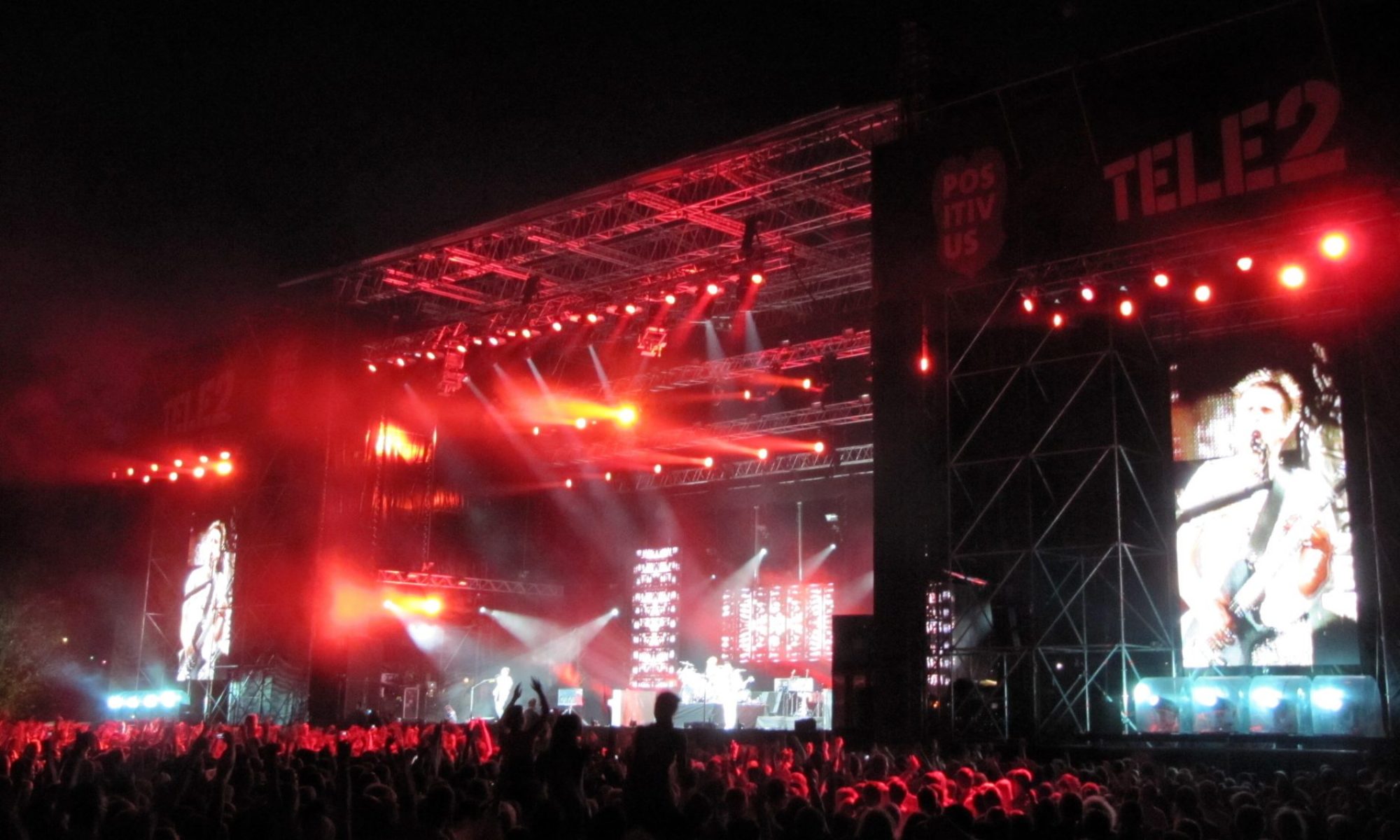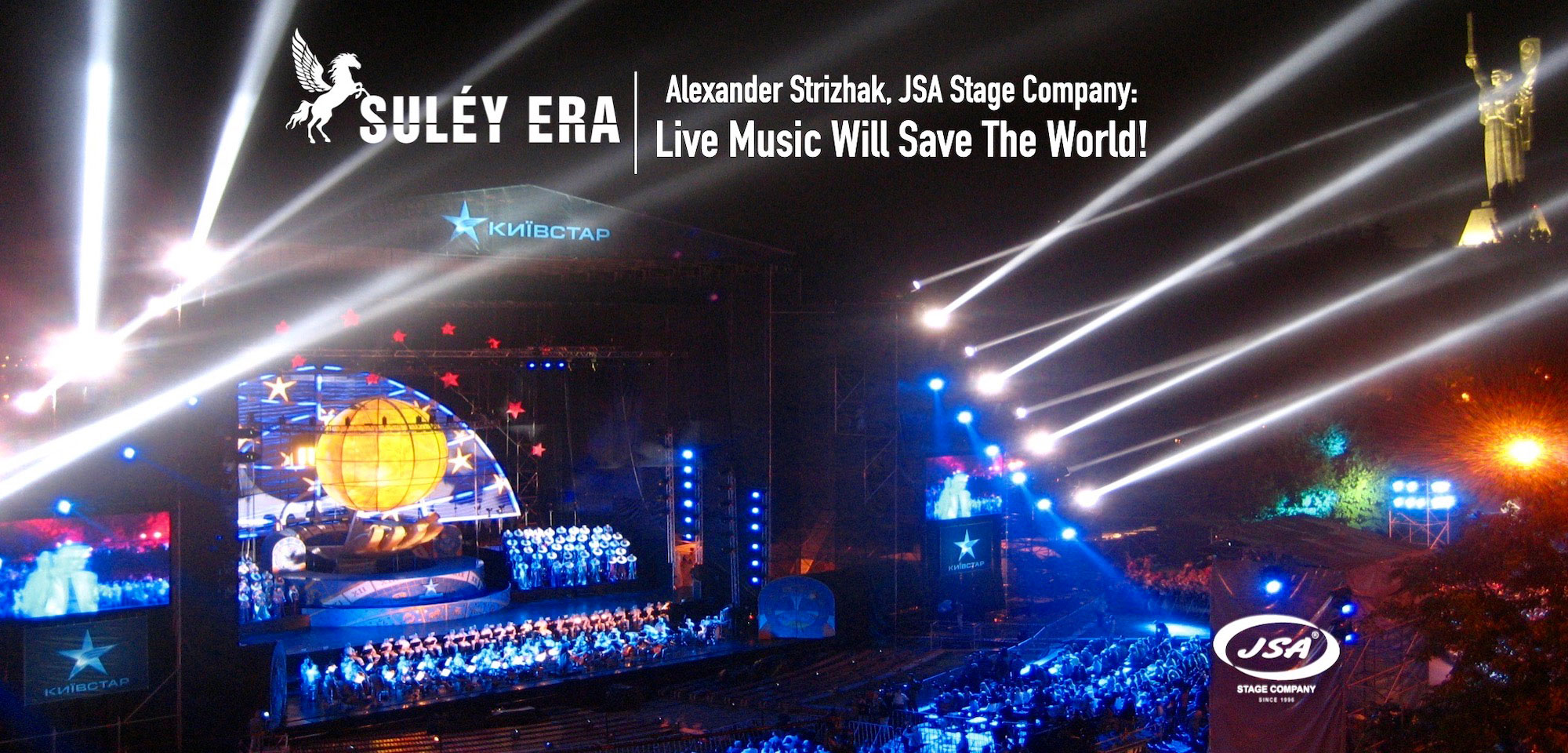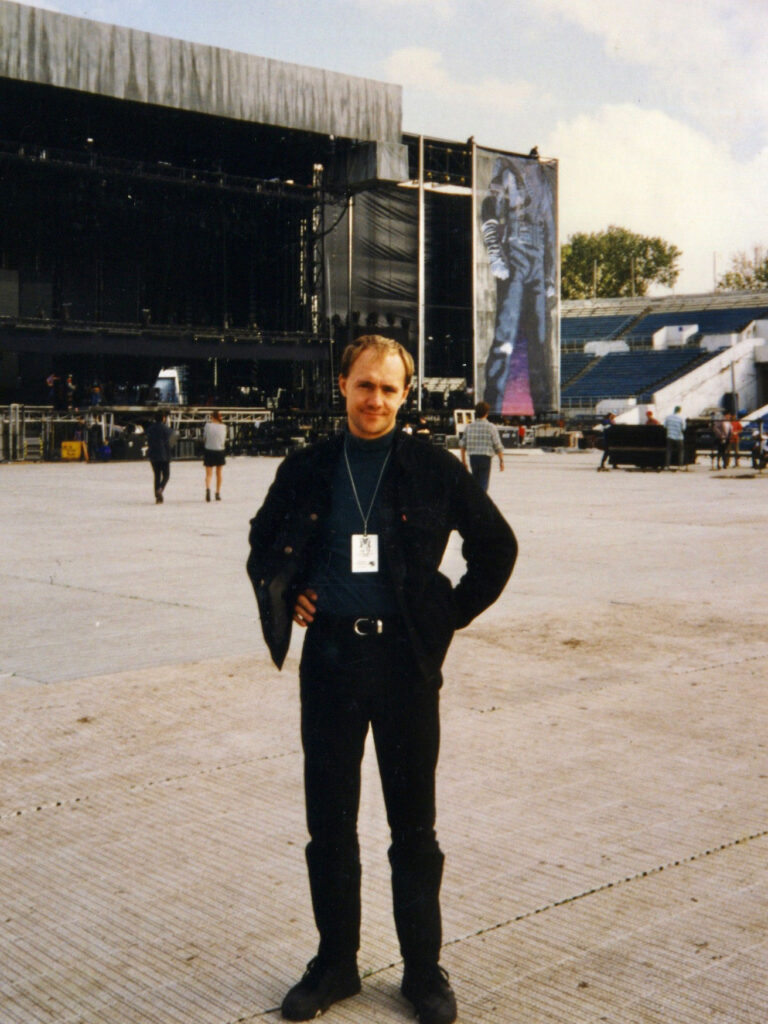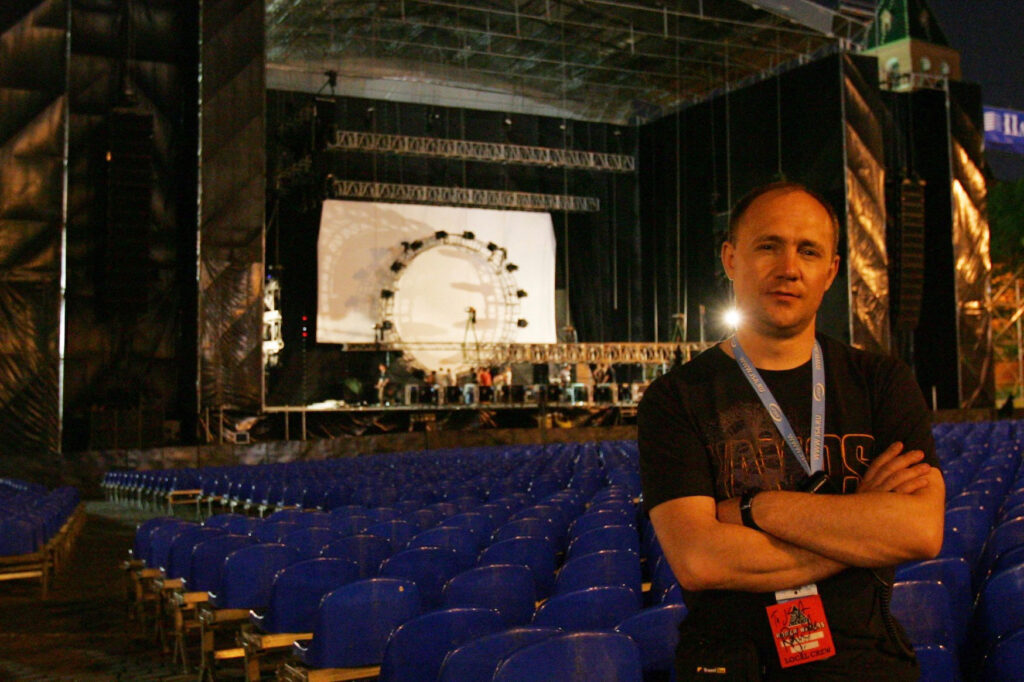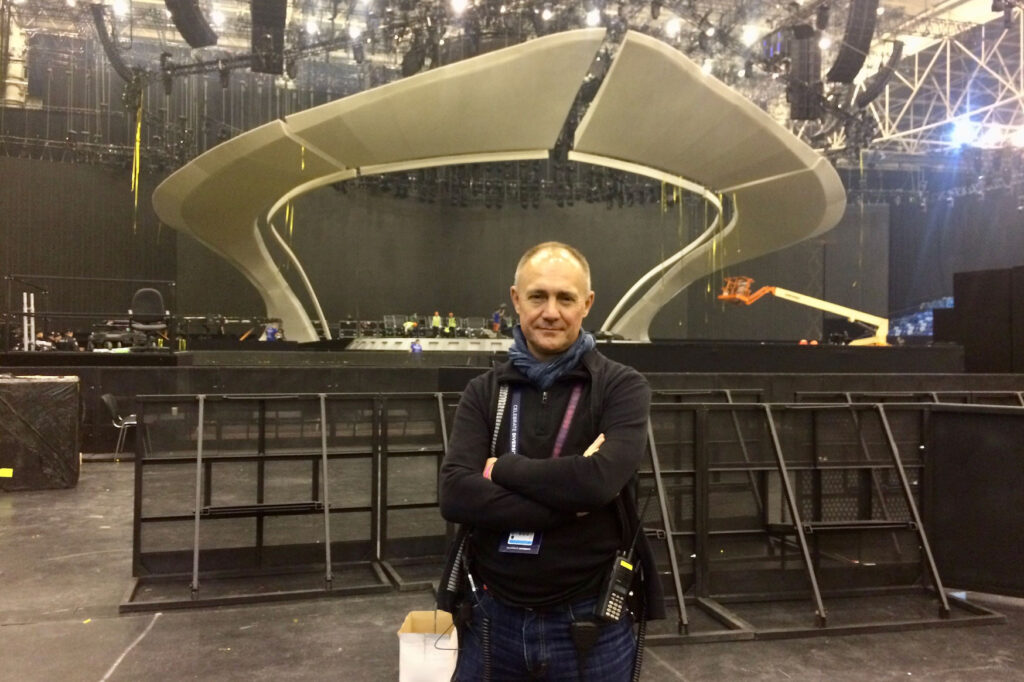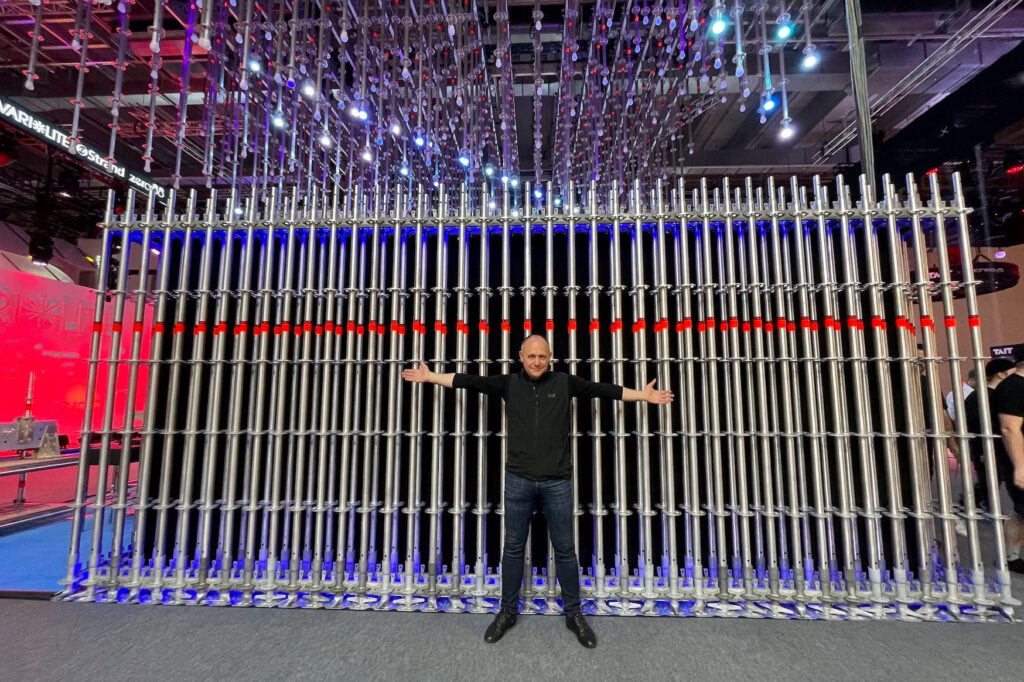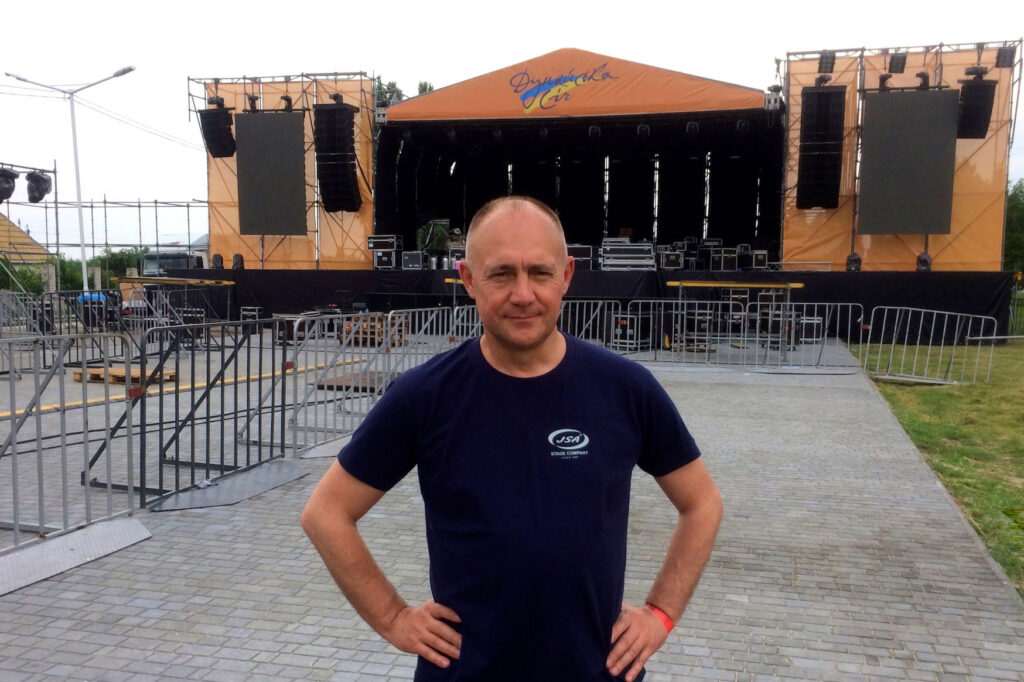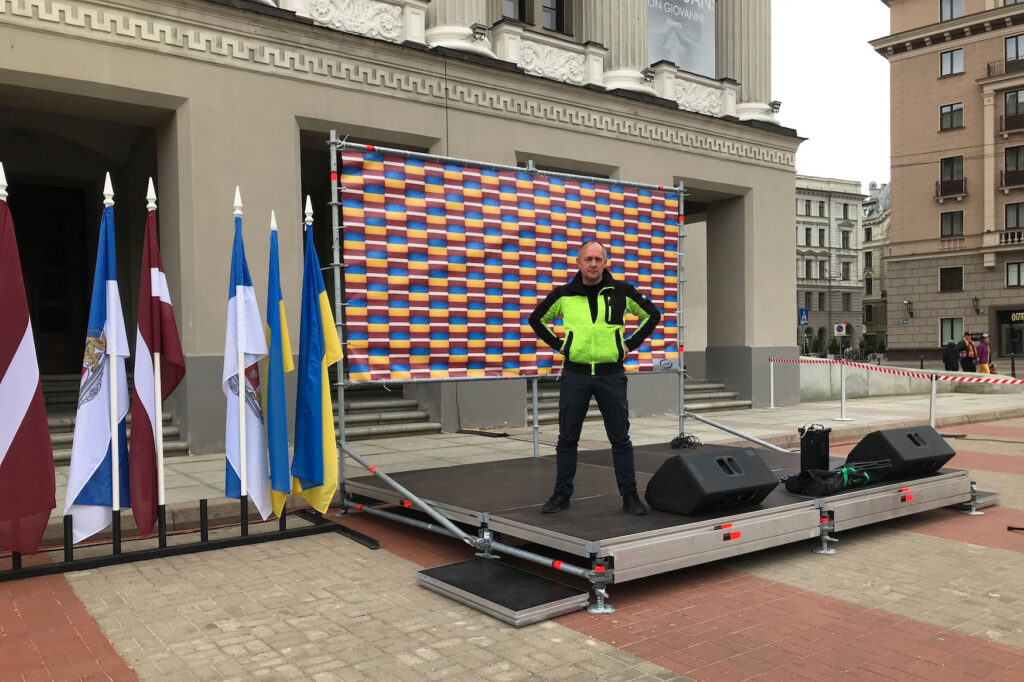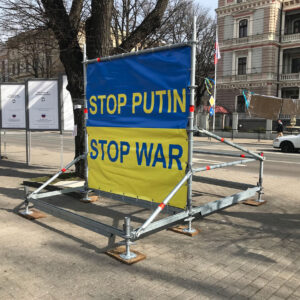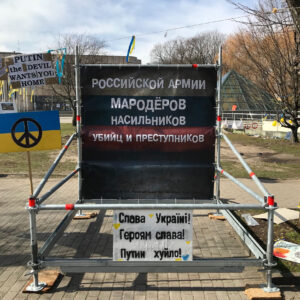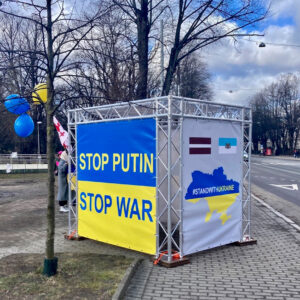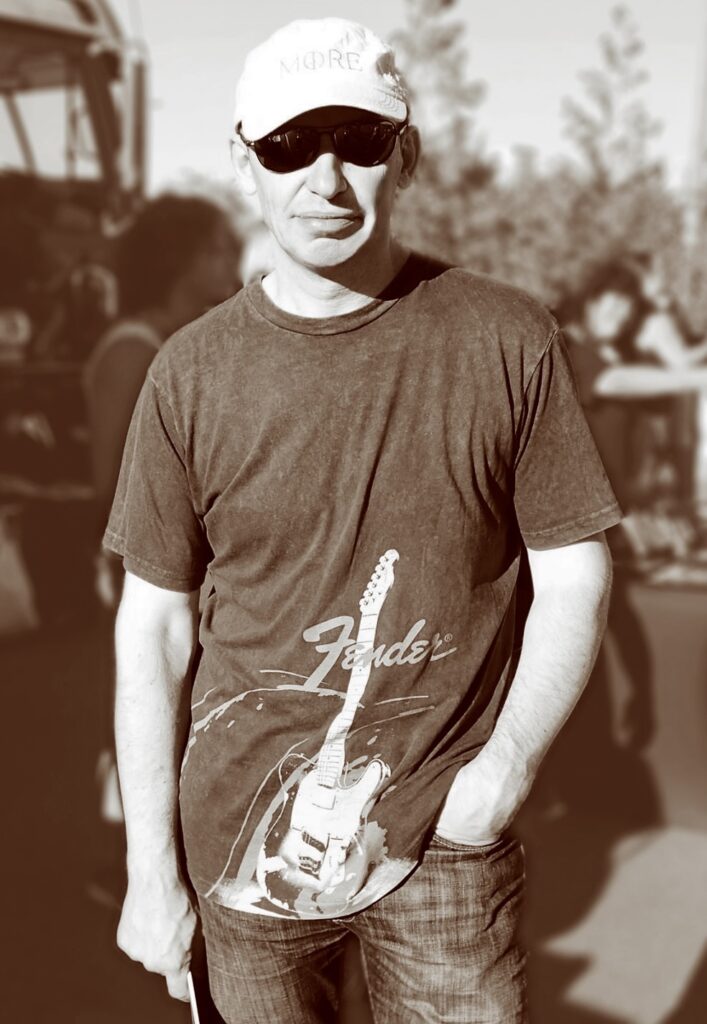The founder, owner, and managing director of the company, Alexander Strizhak, gave an interview to the US online edition. He spoke about the history of the company, about the trends in the concert and event industry after two years of the Corona crisis, and about the situation related to Putin’s Russia war in Ukraine.
Interview by Gene Aaron. Taken on May 10, 2022. Seattle, WA – Riga, Latvia. Especially for the US Internet cultural platform – SULÉY ERA
INTRODUCTION:
JSA Europe / Stage Company specializes in stage setup and construction for live events and managing the production of live music concerts and festivals. It has been well-known in Eastern Europe since its foundation in 1996 in Moscow, Russia. In 2014 JSA closed its Russian operation for political reasons and moved its headquarters to Riga, Latvia, and since then focused on Baltic States and Ukrainian markets.
In its 25-plus years of history, JSA worked with world-renowned artists, such as Michael Jackson, Jean Michel Jarre, Paul McCartney, Rolling Stones, KISS, Korn, Madonna, Roger Waters, Joe Cocker, Ozzy Osbourne, Rammstein, George Michael, Julio Iglesias, Metallica, Montserrat Caballe, Muse, Liza Minnelli, Whitesnake, and many others.
JSA participated in the production of Eurovision-2009 in Russia and Eurovision-2017 in Ukraine (in the sector of the VIP Hospitality Area).
In 2015 Community of Professionals by IQ Magazine included JSA in the list of the world’s Top 100 production companies as a company in the Top 10 in the category of Staging & Rigging.
Right after the Russian Federation invaded Ukraine, the company, especially its founder Alexander Strizhak, immediately responded by organizing relief aid for Ukrainian refugees and war victims.
ALEXANDER STRIZHAK: LIVE MUSIC WILL SAVE THE WORLD!
GA: Alexander, you started JSA in Moscow, Russia in 1996 and quickly became one of the largest stage and show production companies in the region. Tell us a brief history of how the company was established?
AS: I decided to start my own business and found a company on September 17, 1996, in Moscow. That day there was a show by the great Michael Jackson at the Dynamo Stadium, where I was a local production manager (technical director) from the Russian promoter of that concert. So that day has become the founding date of JSA. At first, the company worked as a production agency for the technical support of events and concerts with a staff of three people: a secretary (office manager), a driver/assistant, and me as a business manager.
Before that, I already had experience as an administrator and technical director at the Grand Show System Company. We created Russia’s very first warehouse of steel stage structures. It was a local production of basic stage elements similar to the Layher brand. It is important to understand that in that post-Soviet period in Moscow, St. Petersburg, and Russia in general, no companies provided a real and correct service in setting up stage structures. Everyone was mainly involved in lighting and sound equipment (and usually for indoor venues).
In 1997, on the eve of the celebration of the 850th anniversary of the City of Moscow, my company received a large package of orders both for production management and for the installation of stage structures for various events, including, most importantly, for the famous Jean Michel Jarre mega-show “Oxygen in Moscow” (3,500,000 spectators). JSA was the general local contractor for all technical aspects of the production of this unique concert. Considering the above, I received prepayments for the production of stage structures for eight major events (including JMJ), thus raising enough money to purchase the first set of Layher (four full trucks) for the stage business.
Our five 27-meter towers stood on the square in front of the main building of the Moscow State University on Sparrow Hills. Within the same project, we formed a core team of scaffolders and stagehands, who were selected from 600 workers who were invited from the outside to participate in the work, according to a rider from the JMJ production team. Thus, JSA obtained the first set of Layher (Made in Germany), a piece of real professional equipment for the construction of temporary structures. Subsequently, we became friends with the Layher plant, and for ten years, from 1999 to 2009, we were Layher’s exclusive partner in promoting and selling their products in Russia. Our friendly business relationship continues to this day.
In addition, since 2003, JSA has become the exclusive distributor of the Prolyte plant (Netherlands), which manufactures aluminum trusses and podiums. Our successful collaboration also lasted ten years, until 2013.
Currently, we continue our business relationship with the new company of Fokko Smeding, the former founder of Prolyte and now the owner and manager of SIXTY82, an innovative aluminum stage construction company.
GA: You work with the biggest artists in the world. What aspects of production, logistics, and communication are most challenging?
AS: Even though our business sector was closed for any activity during the last two Covid years, there is a growing demand for temporary stage construction services in the upcoming Summer season of 2022. Just as before, today in Europe (and I don’t know the situation with this in America) there is a lack of equipment and specially qualified specialists. The market for live concerts and events is constantly evolving, with more artists, tours, and festivals. The need for design is growing.
After the famous U2 tour and their 360 stage, the engineering level of the structures being built for the show is being raised. The volume of “metal” for staging structures is increasing, as there is a huge demand from scenography designers for the events. There is also an increased demand for additional event infrastructure structures: towers, bridges, grandstands, and so on.
In my opinion, the main problem of this season, after COVID-19 restrictions, is that all live event production companies will face a lack of professional staff. Due to a long time of business downtime, many teams ceased to exist, and people found other jobs. This will be the first blow that must be sustained, and after that, everything will be restored to normal. Our profession is very interesting and attracts worthy and interesting people.
GA: Can you share some funny, curious, odd, or fascinating stories or situations that happened during show production?
AS: In the light of today’s war of Putin’s Russia in Ukraine, which has a lot in common with its actions with Nazi Germany, I recall an episode that took place back in 2005 as part of the celebration of the 60th anniversary of the victory in WWII on the Red Square in Moscow. A month and a half before May 9, I was invited to the State Kremlin Palace for a meeting on preparations for a big concert, which should start after the traditional Military Parade. Such a large-scale show was organized for the first time since the collapse of the USSR. Apparently, it was then that the official propaganda theme of “victory madness” began as a tool for the militarization of the country’s population. So, at the meeting, it turned out that along with the GUM building (a historic department store building opposite the Kremlin and the Lenin Mausoleum), a huge Wall-Stage (length – 130 m, height – from 20 to 35 m) should be installed. However the contractor who was supposed to carry out the development at the last moment refused to participate in the project.
So my company JSA, as the only professional company with the largest warehouse of structures and a respected reputation, was invited to save the current situation with the project, which was under the supervision of the FSO and the FSB. We (our engineers) quickly produced drawings and calculations of the necessary design for this event. It included the structure of the wall and the tribune, which, at the direction of the Administration of the President of the Russian Federation, was supposed to cover Lenin’s Mausoleum for the first time and where 60 heads of foreign countries were invited as guests to the Victory Parade would have to sit during the parade.
However, in the course of work, it turned out that even my company did not have enough Layher elements for this structure. To install the structure, we urgently needed to get four full trucks with new equipment from the factory. I quickly turned to the Layher factory to find out how things were with production. I requested to ship all the necessary products as quickly as possible and without prepayment, on my word of honor with later payment. I was told that they believed my word and would wait for the payment for the order (delayed for three months), but at that moment, they did not have enough elements we needed in their finished product warehouse. They did have some equipment available for other customers, but they would be able to produce the kit we need only by the end of June. Then I explained in detail why we needed that kit and the complexity of the situation with the preparations for celebrating the 60th anniversary of the Victory over Germany. Layher’s management said in response that they would communicate their decision the next morning. In the morning, as they promised, a fax came to the JSA office that our order had an increased priority and would be completed urgently, that we could send trucks to pick up the load in three days. Thus, everything arrived on time, JSA installed all the structures on time, and thus the German plant Layher and the JSA company saved the Parade and the big concert event on Red Square in honor of the 60th anniversary of the USSR Victory over Hitler’s Germany.
By the way, there is one more peculiar but similar phenomenon – at the core of the fake Reichstag building in Patriot Park near Moscow, which is “stormed” every year in honor of May 9 V-Day, there is also a structure made of elements of Layher scaffolding systems made in Germany. But this is not our story…
GA: What brands of staging equipment do you represent and partner with? What was your biggest hit at the recent Prolight + Sound 2022 show in Frankfurt am Main on April 26-29?
AS: JSA traditionally works with Layher and SIXTY82 products. These brands represent the most advanced technology in the business of installing temporary stage structures and infrastructure facilities in the live music and large event production industry. Since we partner with these factories to promote and sell their products, we worked at their booths at PLS 2022 in Frankfurt, helping them to present their products to our potential customers from Eastern Europe. Unfortunately, due to the war in Ukraine, there were just a few Ukrainian friends and clients at the trade show. The JSA company closed its activities in Russia long ago, and we are not interested in the Russian market anymore. It happened after the events on the Maidan in Kyiv, the annexation of Crimea, and Russia’s military aggression in eastern Ukraine.
GA: In 2014, you closed all your operations in Russia for political reasons and moved to Ukraine and then to Riga, Latvia. How has this affected your business, and how did you manage to go through such drastic transitions?
AS: I was forced to close my business in Russia in 2014 for personal political reasons. It was very challenging and difficult for such a large company with a large staff. We had our main office in Moscow, a large equipment warehouse in Lyubertsy, Moscow region (since 1997), a branch in St. Petersburg (since 1998), and a branch in Kyiv, Ukraine (from 2007 to 2011). So, after closing our operations in Russia, JSA continued to work as a legal entity in Latvia, where the company had its European headquarters in 2003 and became the assignee of the brand and the legacy of the Moscow-based JSA. However, the main operating activity of the company continued in Ukraine, where during this time, we have gained many business partners and customers. Based on my experience, I can say that I understand how difficult it is for global brands and companies to close their businesses in Russia because of the sanctions and their position regarding the actions of the Kremlin regime in Ukraine.
GA: Immediately after Russian aggression against Ukraine, JSA took a very strong and open position of condemning the war, condemning the atrocities of Russian forces and showing unprecedented support to the Ukrainian people. What actions have you been initiating personally, and what JSA as a company has been doing to support Ukraine?
AS: Yes, immediately after the start of the war, we made an open statement against Russia’s military aggression in Ukraine. We immediately outlined the position that we would not hide behind a blanket of “purely business and no politics”. The following days showed that almost all clients and partners supported us in this aspect. I was especially pleased with the personal position of our friends – the owners of the Layher and SIXTY82 factories, who personally wrote me words of support. By the way, on the Layher website, Russia has been removed from the list of countries where their products are sold.
As a citizen of Ukraine (since 2014), me, and my employees cooperated with the Ukrainian diaspora in Latvia even before February 24. In particular, we are members of the Confederation of Ukrainians in Latvia VICHE. JSA also cooperates with the Ukrainian Embassy in Latvia. Therefore, immediately after the start of the war, we were included as volunteers in various forms of assistance with the Embassy and the Confederation “VICHE”. Our work includes sending humanitarian cargo to Ukraine on cars (minivans) to the border and picking up refugees on the way back, as well as participating in anti-war actions in Latvia (mainly in Riga), supporting charity concerts, and much more.
In the course of JSA’s professional activities, we installed two iconic structures on the square directly opposite the Russian embassy, the country of the aggressor. The first structure – a cube of aluminum trusses with anti-war banners was made at the expense of the company and was installed by us on February 25, the day after the start of the war. The second – a small stand of Layher elements and banners about the Russian army of marauders and murderers, was installed by the JSA on April 12th. In agreement with the Riga City Hall, the constructions will stand until the end of the war/victory of Ukraine.
In addition, JSA will take part as a co-organizer and technical partner in organizing and holding concerts of Ukrainian artists in the Baltic countries.
GA: What, in your opinion, needs to be done to restore peace or at least some kind of normalcy between Russians and Ukrainian people after the war? How can the music and entertainment industry help to heal such deep wounds?
AS: This is a very difficult question. Nowadays, many people are trying to answer it, including politicians, journalists, opinion leaders, and cultural figures. In our company and my family as well, we also ask this question. I will try to summarize my opinion on this topic in general terms. For me, as a historian by education and let’s call it a hobby, it is a little easier and more difficult at the same time. I realized that back in 2003, after the arrest of Mikhail Khodorkovsky and the raid on Yukos, new KGB forces came to power in the Russian Federation. After the “small” war of 2008 in Georgia and the annexation of Crimea, and most importantly, the “hybrid war” in eastern Ukraine that started in 2014, I also realized that Putin’s “Great” war against Ukraine is a matter of time. The anti-Ukrainian hysteria of the Kremlin’s propaganda machine was unfolding in Russia before my very eyes. I saw how the new ideology of Russia’s superiority over the West was inexorably unfolding from “getting up off your knees” to “we can repeat it”.
So now, especially after the horrors under the common name “Bucha”, we have a very complex substance, unpredictable in its state in relations between Ukrainians and Russians. However, this dividing line does not run along the border of the two countries, it happens all over the world, where people from the former Soviet Union live. It is also important to understand that now the attitude towards Russians around the world is changing – from love to hatred. Once again, war raised the difficult question of the Russian language and culture, which are now associated with the enemy, Russian soldiers, murderers, and the zombified population of the Russian Federation, eager for a “special operation” to destroy the “Nazis” and praising “Tsar” Putin – the “leader” of this Z & V campaign in “unreasonable fraternal” Ukraine. So far, no one knows how this war will end. It is clear that it will end with the victory of Ukraine and the West. The question is, at what cost and what would be its consequences? Let’s hope that not with global and more terrible tragedies, although the very beginning of this war is already tragic.
My opinion is that the Russian language will remain as a means of communication, Russian European (I emphasize – European) culture will remain, will be rethought, and will work to build a new Russian-speaking community worthy of the European choice of life. Literature, music, theater, and sports will all be in demand, but on a new platform. Whether it will be Russia, I’m not sure. I think that, as a result, on the territory of the modern Russian Federation, some other country formations / separate or in the form of a real federation of independent entities will arise. I would like to believe in it.
It will be necessary to see how and with what Ukraine will emerge from this war. Dialogue between people and countries will improve sooner or later. Neighbors with a long history of good relations, even after this senseless war, will find ways of economic, commercial, cultural interaction and cooperation and even friendly relations whether they want that or not.
It will be the same with the music industry, especially considering that the Russian show business has mostly supported Putin’s war or remained neutral, which is also silent support for the war. Only a few were able to find the strength and ability to speak out against and take the side of the world. As a result, there is a big gap in relations along this line between artists and fans.
As an attempt to preserve and nurture new normal relations between Ukrainians and Russians living abroad (but not in Russia itself), there may be concerts and festivals with the participation of Ukrainian and possibly Russian performers with a clearly manifested position against the Russian war in Ukraine. Thus, at this stage, it might be possible to maintain normal human contact. Then we’ll see…
You can read the original interview here: Alexander Strizhak, JSA Stage Company: Live Music Will Save The World!
Version of the text of this interview in Ukrainian / Версія тексту цього інтерв’ю українською мовою: ОЛЕКСАНДР СТРИЖАК: ЖИВА МУЗИКА ВРЯТУЄ СВІТ!
Version of the text of this interview in Russian / Версия текста этого интервью на русском языке: АЛЕКСАНДР СТРИЖАК: ЖИВАЯ МУЗЫКА СПАСЕТ МИР!
Alexander Strizhak said after the release of the interview online: “Many thanks to Eugene Levkovsky for his professional cooperation and promotion in this matter. For my pleasure, I did this interview in the US edition, where I could talk about my JSA Stage Company, the dastardly war of Putin’s Russia in Ukraine, and of course about my profession in the industry of live music and events”.
You can watch and read other interviews of Alexander Strizhak in Russian here: ИНТЕРВЬЮ АЛЕКСАНДРА СТРИЖАКА (АРХИВ)
Версия на русском языке: АЛЕКСАНДР СТРИЖАК: ЖИВАЯ МУЗЫКА СПАСЁТ МИР!
© All photos are the copyright of JSA Stage Company.
